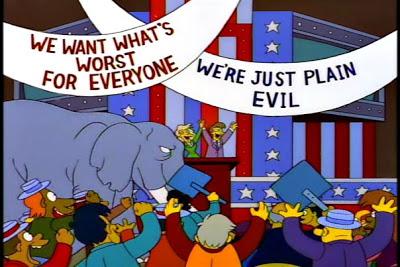 (The image above was found at the blog called Citizen Crain.)
(The image above was found at the blog called Citizen Crain.)The Republicans were riding high during the Bush administration, and seemed very much like a united monolith. But that was before their policies trashed the nation's economy, and then they lost two presidential elections in a row by large margins. Now cracks are beginning to appear in that monolith.
It turns out that the Republicans aren't as unified as they would like for us to believe. They may be nearly completely a white people party, but all of those white people don't believe the same thing. The Republicans know they have to change what they've been doing to get more votes, but the crazy thing is that none of the disparate elements in the party want to moderate their views. Instead, the differing groups in the party all seem to believe the road to victory lies in their own control of the party that their own agenda will save the party.
On his website, The Cloakroom With Taegan Goddard, Goddard outlines the disparate elements in the GOP that are fighting to control the future direction of the party. Here are the arguments as he sees it:
1. Libertarians vs. social conservatives
These two GOP strains have never gotten along with each other. One group says government should stay out of people's personal lives while the other tries to impose its own morality on others.
2. Right wing populists vs. the pro-business crowd
Despite campaign rhetoric, pro-business Republicans are usually just fine with government subsidies, liberal immigration policies, and bailouts — as long as they help keep the profits flowing. But the populist strain in the party sees big business as no better than big government.
3. Deficit reduction hawks vs. small government activists
Though it would seem these two groups have a lot in common, real deficit hawks recognize we must raise taxes along with cutting spending to get the country out from under the debt burden. But the small government fanatics are against all tax increases for any reason.
I think he put it pretty well. Those groups can only really get along when they are in power and each can get at least some of what it wants. But they aren't in power, and now their basic disagreements become more obvious. Who will win the war, and ascend to dominance in the party? We won't know that for a while, but I wouldn't bet against the Wall Street/Corporate crowd -- they've got the money.
The good thing for Democrats is that no matter who wins, some are likely to leave the party in anger. And that won't fix the GOP's problem. They need to appeal to more people -- not less.

